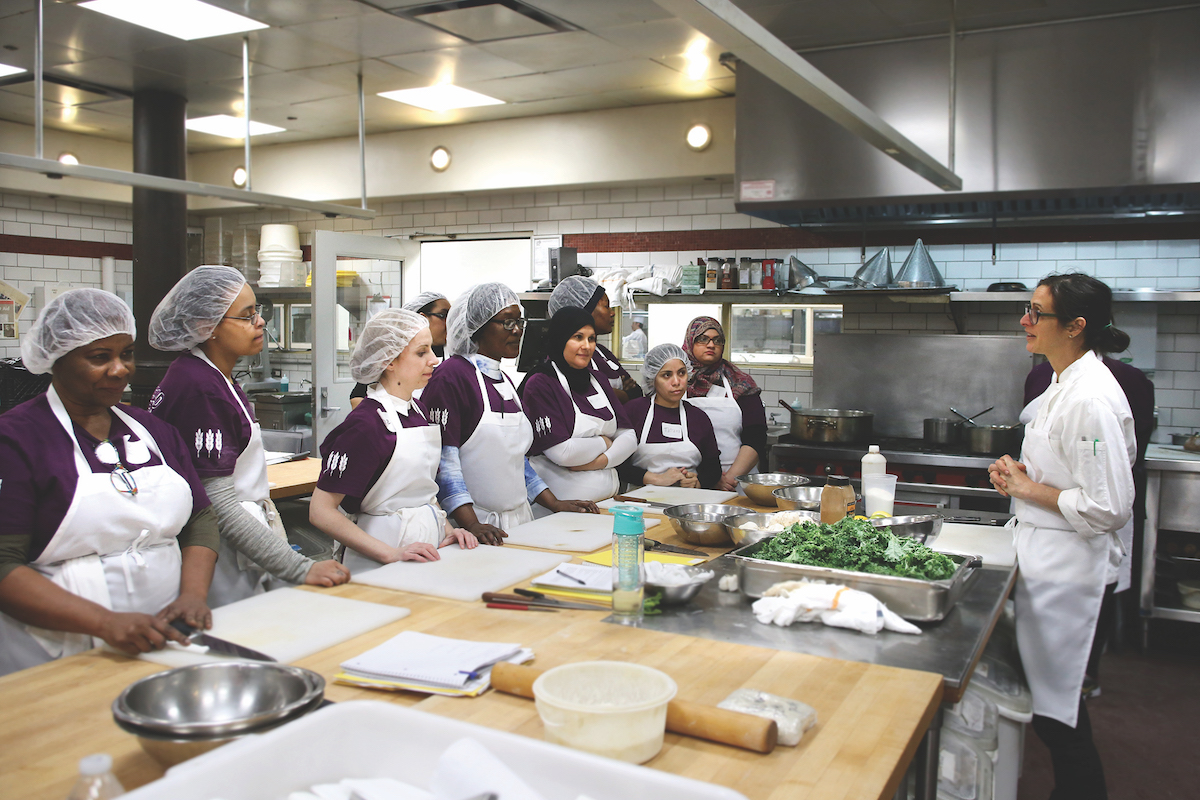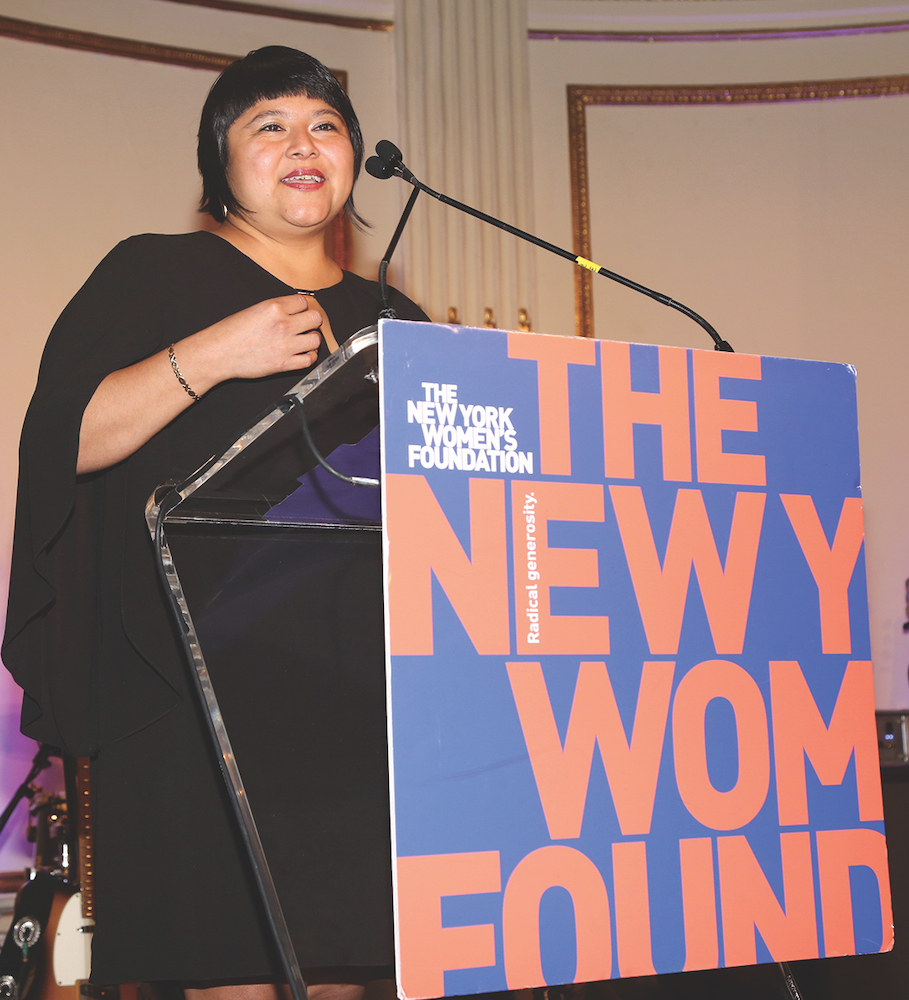Bringing About an Era of Radical Generosity

Did you know that the word “radical” comes from the Latin word for roots? “Radical means going to the roots, not staying at the surface,” explains Ana Oliveira, president and CEO of The New York Women’s Foundation (NYWF). “When the roots are strong, they allow the plant to grow, and the winds to come. The plant can bend but it doesn’t break.” The NYWF has a proud tradition of “radical generosity,” a deliberate shift away from the scarcity mentality that limits women’s funding and opportunities. “Radical” signals the depth of their commitment and the steadiness with which they provide support, not upheaval or extremism. As for “generosity,” where some see paternalism, the NYWF sees endless abundance and grace. Radical generosity is both grounded and expansive, an antidote to fear by investing in people.
Inclusive Decision-Making
The NYWF was founded in 1987 by a group of women in New York City who saw how underfunded women’s organizations were, knew how critical women are to a functioning society, and decided to create a local fund run by women for the benefit of women. The problem was they didn’t know where to invest. To solve this, the NYWF reached out to community leaders for answers. From its inception, the NYWF developed a cross-cultural alliance with local leaders from all over New York City, including from Black, Latinx, and Asian communities.

“We believe that we’re bringing the capital, but they are bringing ideas and solutions.” Oliveira admits that certain power dynamics are inescapable in philanthropy – “we can always say no.” To mitigate this, the NYWF has developed a participatory approach to grantmaking that is inclusive, is deferential to local knowledge, and brings more dignity to the process. Decision-making power is distributed, with funding recommendations made by teams composed of donors, community members, and foundation staff. Partnerships last a minimum of five years, giving organizations time to grow and thrive.
Hot Bread Kitchen is a shining example. It was established in 2008 with a group of immigrant women baking bread in the Brooklyn home kitchen of founder Jessamyn Waldman Rodriguez. They asked the NYWF to help them buy a commercial oven and become a 501(c)(3) to expand their operation and support themselves. Today Hot Bread Kitchen is one of the top job training incubators for women in the culinary industry in New York City.
As part of their integrated approach, the NYWF stresses the connection between gender, racial, and economic justice. “Philanthropy has to be grounded in women’s real lives,” says Oliveira. “We negotiate our lives through an enormous number of prisms, and grantees need to trust they can show up as their whole selves.
“If someone is housing-fragile, it will be very hard for her to build any kind of economic security. If she lives in a violent community, or in a violent interpersonal relationship – either emotionally, verbally, or physically – it’s so hard to hold on to a job, or keep stable housing. We include those dimensions, and we follow our grantees.”
Proudly Supporting the Community
New Yorkers take pride in being trend-setters, and the NYWF is true to its hometown. In 2015 they launched the landmark NYC Fund for Girls and Young Women of Color, which has invested in hundreds of organizations supporting the next generation of policy leaders and community organizers. The fund has since inspired similar funds for girls of color elsewhere. The NYWF were early supporters of the #MeToo movement, and the National Domestic Workers Alliance. With such strong connections on the ground, the NYWF is proud to be the first stop for nascent movements.
Why fund women? “Women are underfunded as a destination. But we’re not just a destination. We’re multipliers. We are hubs of things, moving the spokes in the wheels of opportunity.” Oliveira joined the NYWF in 2006 seeking to make a greater impact. She’d previously worked on solving the crack epidemic, which was devastating for low-income women of color, and at the intersection between substance abuse and criminal justice reform. It was important work, but, as she puts it, “I felt like I was coming too late.” The NYWF’s early investment in community-led solutions was appealing for precisely that reason.
As has repeatedly been shown, investing early in women and girls is not only right but also smart. “[Women] are critical partners, critical agents, critical leaders, and critical followers.” Losing autonomy, safety, and opportunity is not only personally devastating but also creates immense societal ripple effects.
Adapting to Times of Crisis
Recent years have been especially challenging, and the NYWF has worked hard to adapt to each crisis. As community problems change, so must the solutions. The NYWF’s flexible and trust-based participatory approach to grantmaking, long-standing community relationships, and knowledge of smaller organizations also makes them a key player in NYC disaster response.
When Hurricane Sandy hit, none of the relief funds from the Red Cross made it to the NYWF’s grantee partners, prompting the NYWF to reach out and offer to make the necessary connections. Similarly, when New York City was the global epicenter of the COVID-19 pandemic, the NYWF created a COVID-19 Response and Recovery Fund. “We needed our grantee partners to survive. They’re first responders in their communities.” Once again, they funneled relief funds from larger organizations to the smaller organizations the NYWF supports.
What Lies Ahead
Moving beyond the gender binary can be complicated for women’s organizations, but the NYWF has embraced change. Grantee partners, especially those working with young people, were reporting that young people were alienated by rigid notions of gender. The NYWF listened and in the spirit of radical generosity grew its umbrella to include gender-expansive people. “It’s not instead of; it’s in addition to.”
Looking forward, the NYWF continues to play an essential role as a mid-level funder with close ties on the ground. They provide ongoing support on perennial issues like reproductive justice and gender-based violence. They’ve responded to the migrant crisis by helping women find employment. They serve as early investors, intermediaries, and conveners, and connect small organizations in need of funds with other inspirational organizations that build community capacity and support women’s leadership.
The New York Women’s Foundation
Donate now!www.nywf.org
(646) 564-5972
SVP, Programs & Strategic Learning: Camille Abrahams Emeagwali
Mission
Since 1987, The New York Women’s Foundation has advanced a dynamic philanthropic strategy based on the fundamental reality that, when women and gender-expansive people thrive, their families and communities also thrive. Our work is rooted in gender, racial, and economic justice, and The Foundation is among the largest women-led grantmaking organizations in the world.
Begin to Build a Relationship
We know you care about where your money goes and how it is used. Connect with this organization’s leadership in order to begin to build this important relationship. Your email will be sent directly to this organization’s director of development and/or Executive Director.